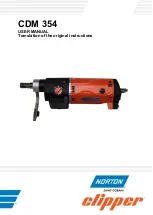
10
English
240 PAH
The battery-powered pneumatic drill hammer can be
used universally for hammer drilling and drilling as
well as for screwdriving in wood, metal and plastic.
☞
This pneumatic drill hammer is not suited for
chiselling work (also not with pointed chisels).
WARNING! When using battery-driven tools basic
safety precautions are to be taken, including the fol-
lowing, in order to reduce the risk of fire, batteries
leaking and persons becoming injured.
Before operating the machine, please read through
the operating instructions completely, follow the
Safety Instructions in this manual as well as the gen-
eral Safety Instructions for Power Tools in the
accompanying booklet.
Important instructions, which should be read
before starting operation, and which we strongly
recommend observing:
– For charging the batteries, only use a charger
which is recommended by the manufacturer and
never use the recommended charger to charge
other electrical equipment.
– Never carry the tool with your finger on the switch.
– Before any work on the machine itself, remove the
battery.
– Do not use any defective or deformed batteries.
– Any machines and batteries that are not being
used should be kept separately in a dry place that
is high up or locked, out of the reach of children.
For safety’s sake, a battery charger connected to
the mains should also be permanently supervised.
– Do not expose the machine, battery and battery
charger to rain. Do not use the machines in a wet
or damp environment.
– Always keep the battery and battery charger clean
and dry.
– Do not open the battery and protect from impact.
– Protect the battery from heat and fire: Danger of
explosion! Do not place the battery on radiators or
expose to strong sun rays for a longer time; tem-
peratures over 50 °C cause damage.
– In extreme conditions battery fluid can leak out.
This does not mean it is defective. If in such a case
the casing is no longer sealed and battery fluid
comes into contact with the skin, proceed as fol-
lows:
1. Wash affected skin immediately with soap and
water.
2. Neutralise the battery fluid with vinegar or lemon
juice.
3. If the eyes are affected, rinse with clear water with
at least 10 minutes. Consult a doctor immediately!
– Before connecting the charger to the mains, please
check that the voltage of your mains connection
corresponds to the voltage stated on the name-
plate of the charger.
– Always inspect the plug and cable before use. If
damaged, they must be replaced by a qualified pro-
fessional.
– Caution - High voltage: Do not open the battery
charger!
– Ensure that the connection between the battery
charger and battery is correctly positioned and is
not obstructed by foreign bodies.
– Keep battery charger slot free of foreign objects
and protect against dirt and humidity. Store in a dry
and frost-free place.
– When the battery is outside the battery charger,
cover battery terminals to avoid short circuits from
metal objects. Danger of fire or explosion results
when shorted by a metal object!
– Do not charge batteries of other manufacturers.
Only use genuine Kress accessories.
– Observe notes on environmental protection.
– When drilling or screwing in walls, they must be
checked for hidden electric cables or water and gas
pipes with a detector.
– Do not work with materials containing asbestos!
– Do not drill holes into the housing to label the
machine. The protective insulation will be bridged.
Please use self-adhesive labels.
– Protect the cables of the battery charger from
sharp edges. Damaged cables must be replaced
immediately by one of our service depots.
– For safety reasons, work only with the auxiliary
handle 10 mounted.
– Wear protective glasses, hearing protection, pro-
tective gloves and sturdy shoes.
– When the drill unexpectedly jams, the machine
kicks back. Therefore, always take a secure stance
and hold the machine firmly with both hands.
1
Application
2
Safety Instructions and
Accident Prevention
240 PAH - Buch Seite 10 Mittwoch, 30. Januar 2002 1:57 13











































